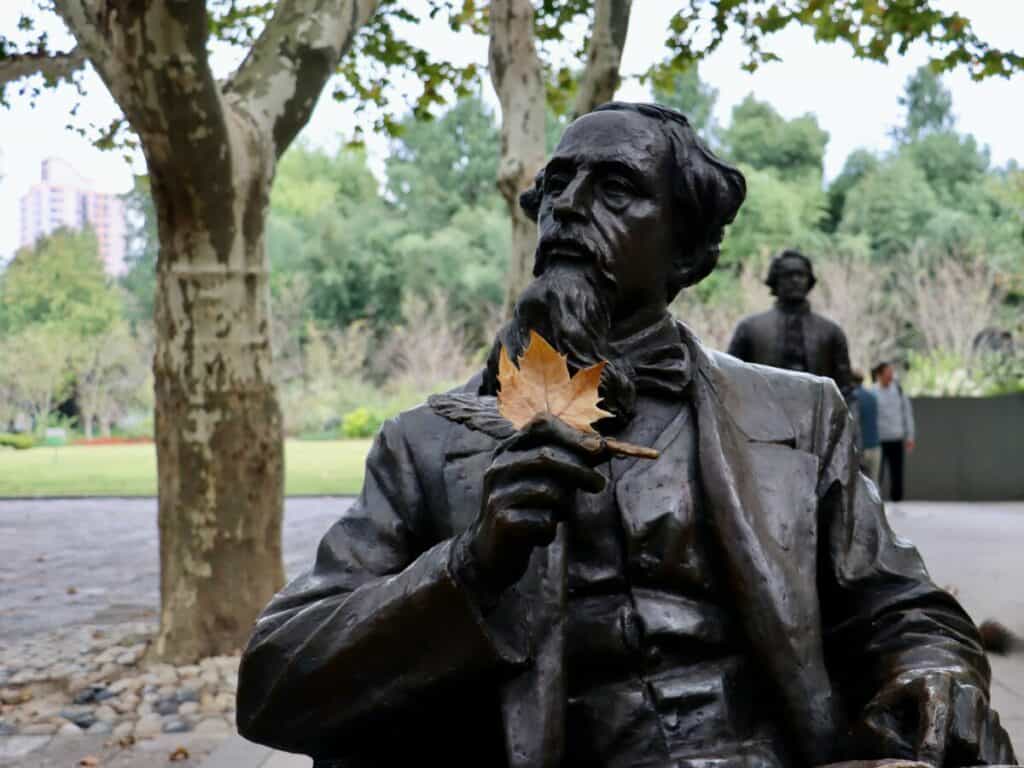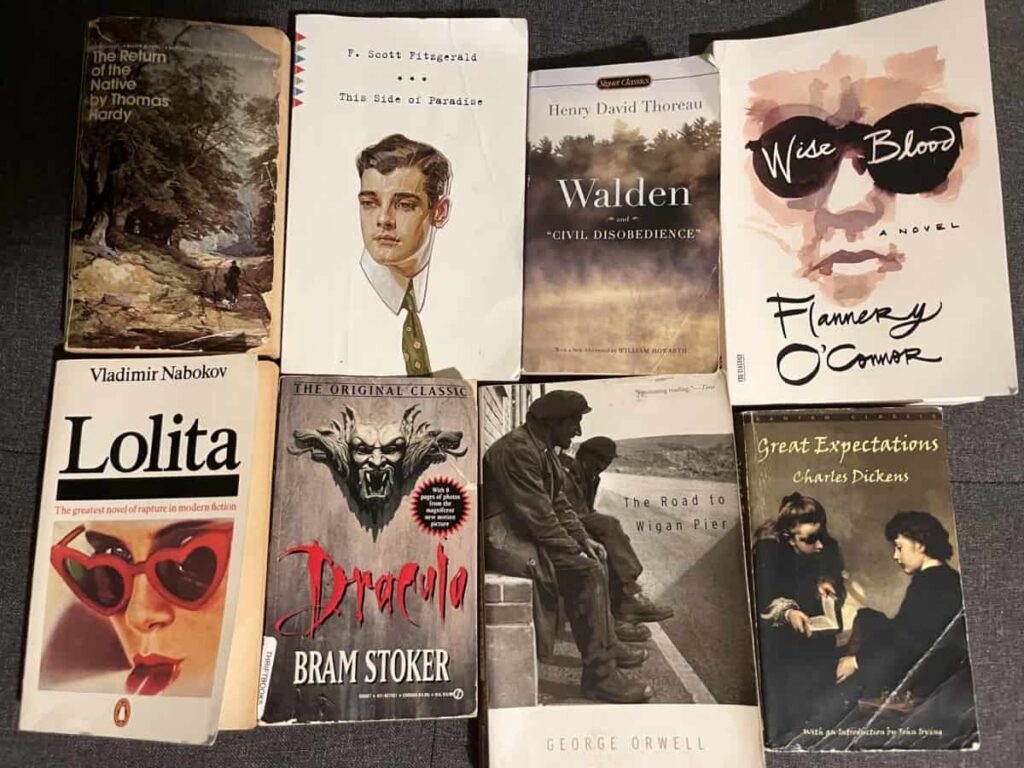“When evening has come, I return to my house and go into my study. At the door I take off my clothes of the day, covered with mud and mire, and I put on my regal and courtly garments; and decently reclothed, I enter the ancient courts of ancient men, where, received by them lovingly, I feed on the food that alone is mine and that I was born for.” — Niccolo Machiavelli
Why, throughout history, have so many of the best writers and wisest thinkers spent so much time reading old books? What competitive advantage has it given them?
That’s the question I’m answering today.
Read on to learn how reading old books will make you wiser, more interesting, more at peace, and better-equipped to rise in your profession and society at large.
1. Reading Old Books Makes Your More Original & Interesting
“Live with your century; but do not be its creature.” — Friedrich Schiller
The greatest thinkers of history were often partly outcasts, shrewd observers of their culture and times, adopting the ideas and customs that suited them and discarding the ones that didn’t.
I think of Machiavelli, Rousseau, and Thoreau, quintessential iconoclasts of Western Civilization. We remember them today in part for their original perspectives. All three of them were readers of the dead writers who came before them.
How to Be an Unoriginal Bore
Here’s a plan for being unoriginal in thought:
Consume and parrot the same ideas and stories that everyone else has on the tips of their flappy tongues.
This is not going to help you stand out as a communicator, thinker, writer, artist, creator, or dinner-table conversationalist.
If you read the same stuff that 90% of people read — the top-sellers from this or last year, the top personal development blogger, Elon Musk tweets — then you’ll speak, write, and think like everyone else.
Diversify Your Information Diet
When, however, your information diet is more varied and includes books from the past, which most peoples’ diets exclude, then you’ll have different things to say, unique perspectives, and the ability to turn old wisdom into new insights that shock and engage.
You’ll find yourself applying a rhetorical tactic you learned from Cicero’s speech to a marketing campaign. Or describing a greedy corrupt businessperson like Dickens would, producing laughs among your friends.
Success Story: The Cultural Tutor
A perfect example of someone using this strategy of reading old books to gain an audience is the successful Twitter writer named The Cultural Tutor.
He writes threads about art, architecture, and history, and has over a million Twitter followers.
On a podcast episode with David Perrel, he said that he avoids books published in the last 50 years. He considers this rule vital to his ability to produce new perspectives and fresh content.
I don’t go that extreme, though it seems to be paying off for him.
Instead, I find a ratio of about 50/50 between new and old (published pre-1980) works for me. That gives me a good balance.
How Much Do You Value Originality?
As a writer and content creator, I probably focus more on protecting my originality than the average person does.
I also put a higher premium on gaining originality than being able to trade anecdotes from the new best-selling personal finance book with someone at a party.
But, I think the majority of people want to be more interesting, more capable of seeing the world through different lenses and offering up wise solutions to problems in work and life.
Want to read more old books?
Sign up for Audible’s 30-day free trial and get 2 audiobooks free if you’re an Amazon Prime member (1 for non-members).
I love listening while I take walks, do chores, and drive around. Helps me get 20 pages per day easy.
2. Old Classics Have Stood the Test of Time

An old book that is still read and recommended today is more than likely a top-tier book.
If it’s survived hundreds or even thousands of years of scrutiny by critics and readers alike, then it’s safe to assume that it’s a great work. Standing the test of time indicates quality.
We don’t hear of the hundreds of books written in 1605. But we do hear about Don Quixote. Time weeded out the others.
“Read the best books first or you may not have a chance to read them at all.”
— Henry David Thoreau
It’s important to note that books like The Republic, The Bhagavad Gita, Don Quixote, and Wuthering Heights aren’t merely historical artifacts for literary scholars.
Generation after generation of readers, regardless of their cultural or social situations, have found these classics insightful, engaging, intellectually stimulating, and spiritually nourishing.
You Only Have so Much Reading Time, So Read the Best
With only so many books you can read per year, why not make sure you’re spending at least some time reading the best of the best?
What better way to give yourself a foundational education in politics, literature, history, morality, and clear thinking, than to read the canonical works?
When American critic Michael Dirda wanted an education, that’s what he did:
“The foundations of learning, I quickly realized, were nearly all located in the past. Time had done its winnowing, and what remained were the works and ideas that shaped human civilization.” — Michael Dirda, Washington Post.
Old Classics are Highly Influential Works

Books that have stood the test of time also happen to be the most influential. The longer they’ve been around, the more they’ve been read, and the more artists and thinkers they’ve inspired and guided.
Many of the great novelists, for example, have been inspired by the works of Dickens, Hemingway, or Tolstoy.
The Confederacy of Dunces, the funniest novel I’ve ever read, is in many ways emulating Don Quixote, especially in its quixotic protagonist Ignatius Reilly.
The great philosophers, economists, psychologists, and other thinkers were often well-read and inspired by the works of their predecessors, responding to them in their works.
It’s likely that your favorite contemporary films, tv shows, books, and poems were influenced directly, or by a few degrees of separation, by some classic old book.
I’m currently watching The Artful Dodger on Hulu, a spin-off of the famous novel Oliver Twist by Charles Dickens.
Become More Cultured
Being able to note artists or intellectual influence is part of what it means to be cultured — to be familiar with the works of art and thought that civilization has produced, and their connections with one another.
This begs the question: why be cultured?
For one, it forms an appreciation in you that will move you to sustain it, and an education that’ll help you defend it.
Now, is your culture worth sustaining?
That’s up to you.
In my opinion, if it brings you joy and peace, protects the human rights of life, liberty, and the pursuit of happiness, and holds to a high regard noble values like truth, justice, liberty, equality, and duty, then I believe it is worth protecting.
Another reason to be cultured is that it can act like a key to get you into places you otherwise might have been excluded from: the upper echelons of society, the rooms where the big decisions are made (as Aaron Burr said, the room where it happens!)
Whether it’s right or wrong, most societies still use cultural fluency as an indicator of one’s status, education, and potential.
The ability to make a Jane Austen reference or describe the history of a famous monument or summarize Nietzsche’s major contributions is a bit of a magic key to some circles of influence.
Further, it’s just fun and empowering to learn about and know this stuff.
Want to become knowledgeable about Western philosophy? Grab your free DIY philosophy curriculum (based off Yale’s requirements for PHIL majors) when you sign up for our newsletter:
3. Old Books Cure the Cataracts of Our Times
The timeless wisdom of classic books protect us from being seduced by every shiny new idea.
C.S. Lewis believed that every generation has its blindspots and incorrect views, the ones that future people will shake their heads at and say “why the hell were they doing that?”
He believed that the best way to avoid the falling for the mistakes of your times is to consult the writers of the past.
“We all need the books that will correct the characteristic mistakes of our own period. And that means the old books.” — C.S. Lewis
Those old writers had blind spots of their own, of course.
Every generation does.
Some of these great writers, along with their genius, may have even been bigoted in some alarming yet obvious, and therefore harmless, way.
For what we can see clearly as unhealthy we can keep out of our system.
But those great writers also had wisdom in places where we now have ignorance or sheer stupidity, and so they can inform us and help alleviate our blindness.
I’ll let C.S. Lewis explain further:
C.S. Lewis on Reading Old Books

“None of us can fully escape this blindness, but we shall certainly increase it, and weaken our guard against it, if we read only modern books.
Where they are true they will give us truths which we half knew already. Where they are false they will aggravate the error with which we are already dangerously ill.
The only palliative is to keep the clean sea breeze of the centuries blowing through our minds, and this can be done only by reading old books. Not, of course, that there is any magic about the past. People were no cleverer then than they are now; they made as many mistakes as we. But not the same mistakes.
They will not flatter us in the errors we are already committing; and their own errors, being now open and palpable, will not endanger us. Two heads are better than one, not because either is infallible, but because they are unlikely to go wrong in the same direction.
To be sure, the books of the future would be just as good a corrective as the books of the past, but unfortunately we cannot get at them.” — C.S. Lewis
The funny thing is we can’t possibly know where our generation is blind. We may have our hunches, but we can not be certain until the future.
So the least we can do to protect ourselves from these bad or half-baked or downright silly ideas is by consulting the wisdom of the past.
Don’t Let Your Mind Seal off the Wisdom of the Past
In The Closing of the American Mind, Philosopher Allan Bloom states that universities serve the purpose of keeping the most important questions of existence front and center, as well as the best answers to those questions.
He uses Aristotle’s works as an example, and then says this:
“We would hardly be able to use Aristotle, as did Hegel, to grasp the character of modernity. Instead we are more and more restricted to the narrow experience of the here and now, with a consequent loss of perspective.” — Allan Bloom
Whether you study them in college or on your own, the classics enable us to more thoughtfully reflect on the condition of our world, and how to improve it. We best not lose that skill.
4. Reading an Old Book is Always Partly a History Lesson
One of the best ways to teleport into the past and get a feel for the cultural and intellectual atmosphere of that time and place is to read an old book produced during the period.
Right now I’m reading Don Quixote and, apart from laughing hysterically, I’m also learning about Spanish political and cultural history, both through the novel itself, which highlights the political controversies of the time, and through a history I’m reading called Imperial Spain, which charts the rise and fall of Spain’s Golden Age in which Cervantes penned his masterpiece.
Want to self-learn history systematically? Check out this 7-step roadmap.
Reading Histories is Not the Only Way to Study History
If you want to learn about a specific time period, don’t just read histories about it.
Read the works of literature, philosophy, and science produced during that period.
You’ll come away with a much broader and deeper understanding of that world, its institutions and events, the people in it, and the ideas they held.
This is why history courses like Yale’s The American Civil War assign old novels or autobiographies like Narrative of the Life of Frederick Douglass to their classes.
Want to know more about the European middle ages? Check out Boethius. Want to understand ancient Rome? Sit at the feet of the stoic philosophers. Want an insight into Victorian London? Read Dickens!
In doing so you’ll pick up some big ideas and great stories, while, at the same time, learning some history.
Why Study History? Check out my article on why every self-education plan should include some history.
5. An Old Book is an Escape From all the Noise

As if the 24-hour news cycle isn’t enough, many contemporary books pile on more reasons to be unhappy with our world’s current condition.
And that can be emotionally exhausting.
Now, don’t get me wrong — reading and thinking about today’s big issues and questions is worthwhile, but every now and then you may find that you need a break.
I know I sure do.
And in these times an old book is like a tree fort in the backyard where you can hide out from today’s debates and troubles, excuse yourself from the dinner table.
Am I Advocating Escapism? Yep.
Advocating escapism is sometimes considered poor form.
“We must contend with our times! We cannot hide out in old books!”
To that I say, “Yes, well, we must also contend with our relationships, our health, our careers, our obligations, our enamel decay, and yet you’re escaping into the news, into social media.”
Reading an old book is no more escapism from our times than the latest news article is escapism from our personal troubles.
Plus, escapism is part of the pleasure. Just call it adventure instead. Adventure through old places, old ideas, old traditions, old stories.
If your corporate uncle doesn’t understand why you’re wasting your time in old dusty books, call it commuting. He’ll nod in approval.
We can act intellectually serious all we want, saying we consume classic works of literature and thought to learn, to gain wisdom, to prompt reflection.
But, the truth is, we also do it to escape into those experiences of high emotion that come from a beautiful story or a sharp argument.
Reading Old Books is a Healthy Way to Escape
Reading classic literature is a better way to escape than my, and society’s, menu of alternatives — mindless entertainment, overeating, alcohol abuse, drug abuse, pornography.
When I’m feeling in need of some escape, there’s nothing quite like slipping into the world of Tolkien.
Or Dickens.

Sure, Dickens’ world had its troubles.
Victorian London suffered rampant economic inequality, child abuse, and corruption, all of which he depicted with such magisterial observation that I feel like I’m there with him.
But I can at least look upon these problems with the comforting knowledge of how far we’ve come as a civilization, how much of his vision of an ideal world where people treat each other well and help one another is here and now.
It’s hard of course not to draw connections to our times.
In Hard Times, for instance, he critiques industrialization and its hardening of mens’ souls. I can’t help but think of how that’s still going on today in many ways.
But for some reason it’s overall a milder irritation if I do experience any angst for our current situation, as if I’m consoled by an old grandpa saying it’ll all work out.
6. There are Just so Many Great Old Books!

Here’s an obvious reason. There are so many fantastic old books out there that have the power to change your life.
Here’s just a handful of my favorite old books:
- Plato’s Five Dialogues, by Plato
- A Farewell to Arms, by Hemingway
- David Copperfield, by Charles Dickens
- Wuthering Heights, by Emily Bronte
- Martin Eden (read why it’s the best book for autodidacts), by Jack London
- The Prince, by Machiavelli
- Black Boy, by Richard Wright
- Letters From a Stoic, by Seneca
- Rousseau’s Political Writings, by Rousseau
- The Master and the Margarita, by Mikhail Bulgakov
- Modern Man in Search of a Soul, by Carl Jung
- This Side of Paradise, by F. Scott Fitzgerald
- Walden, by Henry David Thoreau
These works have all affected me in some profound way, and I intend on re-reading every single one of them at some point. They’re that good.
Want to get into classic literature? Check out the books on my literature reading program for beginners.
Action Item: Read 5 or More Old Books This Year
I’m sure I’ve missed some reasons to read old books. There are just too many.
Now that you understand why you should make old books a part of your reading diet, try to read five this year.
Maybe that’s five books by an author you’ve always wanted to explore. Or five foundational works in a field of study you’re interested in.
Maybe you want to read the classics of philosophy? If so, sign up for my newsletter and receive the free DIY philosophy curriculum (based on Yale’s PHIL major requirements), and get reading!

